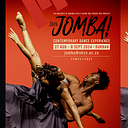Re-mapping home
By Clare Craighead (Guest Writer)
This year’s “JOMBA! on the EDGE” platform returns, after two years of digital dance making, to the live. Three KZN-based dance-makers were awarded festival grants to premiere their work at the 24th edition of the festival on Friday 2 and Saturday 3 September at the Elizabeth Sneddon Theatre.
This year’s grantees were tasked with developing work around the 2022 festival provocation — “the (im)possibility of home”, their work ranging in style and approach. “Home” is interpreted as heritage, culture, identity and emotional state… what a treat to experience such diversity on one platform!
Pavishen Paideya’s SAMSARA performed by his Rudra Dance Theatre opened the programme. Paideya pins the work as “an honest and culturally magnificent dance journey into Diaspora Indian South African identity and ideas of home and belonging”. His signature fusion-styled form brings together classical Indian Bharatanatyam and neo-classical contemporary dance. The combination of styles is not uncommon in South African contemporary dance, from Afro-fustion to Afro-Butoh and anything in between, ours is a dancing heritage that is as complex as it is culturally mixed.
SAMSARA evokes, cycles of death and rebirth. These are profoundly linked to diasporic Indian South African identities in the work. Paideya’s flair for the dramatic is captured, most notably in the work, when dancers — instead of wrapping bells around their ankles, as is customary in many classical Indian dance styles — shackle their ankles. In KZN, 1860 marked the arrival of the first indentured labourers most of whom were brought to our shores, shackled, to work on the vast sugarcane plantations. In Paideya’s work the shackles also offer an image of being shackled in contemporary times, to nostalgic ideas of real Indianness residing in the motherland and the purity of classical dance forms that may not always sit comfortably within contemporary bodies.
TAKE ME BACK HOME is Sandile Mkhize’s response to the festival provocation. It’s a gentle duet between him and collaborator Tshediso Kabulu that with wit and candor asks us to consider “what makes a man a man?” Mkhize locates this question firmly in his Zulu culture. The work performed with precision by Mkhize and Kabulu, feels like a conversation between friends, at times tender and at others probing. Mkhize’s Afro-fusion style is captured in his long lines and suspensions that are accompanied by Ingoma-esque shapes and rhythms. At the heart of the work is the revelation that manliness is a spectrum where opposites may not always attract. Mkhize, as he offers in his programme note for the work, “takes us on a journey to what home means for the body — a place of self-discovery and self-interrogation”. Particularly refreshing in this work is Mkhize’s undermining of notions of violent masculinities.
Following a short interval we are invited back into the auditorium for Tegan Peacock’s HEAD_SPACE. On stage I see Peacock, lying, contorted on the floor, tiny houses perching precariously on her back. A paper house, hanging overhead stage right. Upstage to the left, is a shadowy figure sitting at a table, with the blue glow of a laptop screen illuminating their silhouette. The piece is a collaboration of artists and forms: musician Wayne Reddiar and scenographer Hannah Lax join Peacock in this presentation.
The work offers a relatable exploration of anxiety and isolation. It’s particularly resonant following the last two years of yo-yoing Covid restrictions and lockdowns, and how this impacted on the headspace of so many working in the live performing arts. The simple joy of collaboration having been stripped away while we were told to isolate and “stay safe”… What happens when we feel cut off from community? Peacock’s use of more pedestrian and everyday movement in her exploration of anxiety and isolation seems fitting and aligns with her statement in the programme that the work “attempts to trace the internal conversations of the body and mind in turmoil.”
The 22nd JOMBA! Contemporary Dance Experience runs until 11 September, see the full programme here: https://jomba.ukzn.ac.za/
The JOMBA! on the EDGE programme will be presented by Rerouting Arts in partnership with the 24th JOMBA! Contemporary Dance Experience at the Old Mushroom Farm on Saturday 17 September at 6pm.
